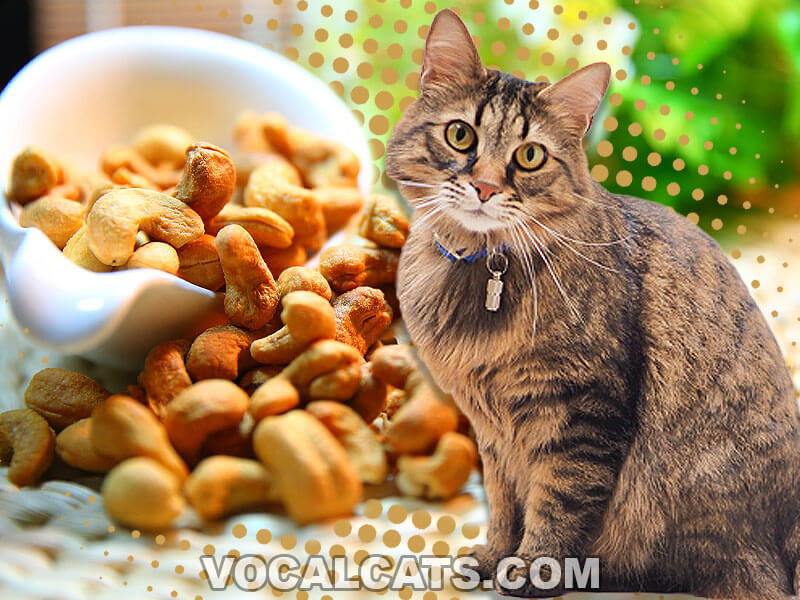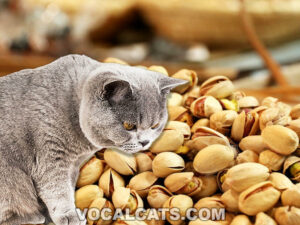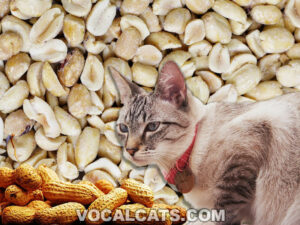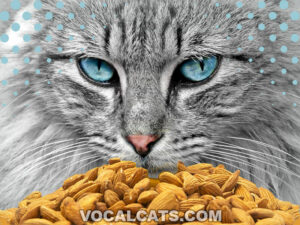Can cats eat Cashews? Yes, cats can eat Cashews in small amounts. Although Cashews are not toxic to cats, they are not a part of a feline’s natural diet. Therefore, consuming Cashews in excess may cause gastrointestinal upset or pancreatitis. Cashews are also high in fat, which can cause weight gain or obesity in cats.
If you’re snacking on some Cashews right now and your feline friends are begging you for some, you may start to wonder, “Can my cat eat Cashews?”
As obligate carnivores, cats have their own specific dietary needs, however, they are also curious creatures and tend to nibble on things they can’t have.
Before you hand over a Cashew to your four-legged friends, you’ll want to read this article first. We’ll discuss whether your cat can have nuts like Cashews and toasty almonds, what to do if your cat consumes more Cashews than she should, and some feline-friendly Cashew alternatives.
Contents
- Can Cats have Cashews?
- What are Cashews?
- What are raw Cashews?
- Are Cashews bad for Cats?
- Are Cashews toxic to Cats?
- Are Cashews dangerous for Cats?
- Are Cashews poisonous to Cats?
- Are Cats allergic to Cashews?
- Are Cashews safe for Cats?
- Are Cashews good for Cats?
- Are Cashews ok for Cats?
- My cat loves Cashews! How much Cashews should I give him?
- My cat ate Cashew! What should I do?
- Can Kittens eat Cashews?
- Cats and Cashews
- Can Cats drink Cashew milk?
- Can Cats have Cashew milk?
- Is Cashew milk safe for Cats?
- Safe and feline-friendly alternative to Cashews Milk for cats
- Can Cats Eat Cashew butter?
- Can Cats have Cashew butter?
- Cats and Cashew nuts
- Can Cats Eat Cashew nuts?
- Are Cashew nuts bad for Cats?
- Can cats eat salted Cashews?
- Can cats eat roasted Cashews?
- Can cats have Cashew yogurt?
- So, Can Cats Eat Cashews?
- Related Questions
Can Cats have Cashews?
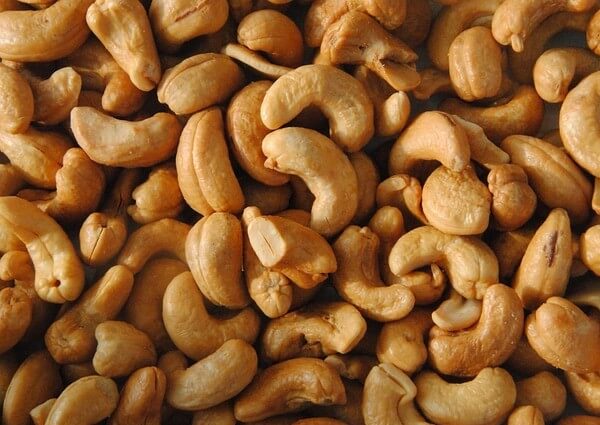
Yes, cats can have Cashews in moderation. That is one or two Cashews once in a while. It’s important to point out that Cashews cannot be a regular part of your cat’s diet.
That’s because Cashews are very high in fat. In just one ounce of raw Cashews, there are about 12.4 grams of fat.
Although our feline friends should have a bit of fat in their diet, this much fat can be more harmful than beneficial for them because it can lead to obesity, pancreatitis, and heart disease.
Cashews also contain a lot of carbohydrates and sodium that cats should consume only in minimum quantities.
What are Cashews?
Cashews are nuts that grow on Cashew trees that are native to Brazil. They are actually the seed of the Cashew fruit, which is shaped like a bell and whose flesh is either red or yellow in color.
The Cashew seed is encased in a hard shell and a toxic outer layer, which one must remove before eating the nut.
Cashews are a popular snack that humans munch on.
They are also used in cooking and baking, particularly in vegan dishes as a dairy substitute.
Cashews are a good source of healthy fats, proteins, and essential minerals such as zinc, magnesium, and copper.
Although we refer to Cashews as nuts, they are technically seeds, and are botanically related to other tree nuts such as walnuts, almonds, and hazelnuts.
What are raw Cashews?
Raw Cashews are simply Cashew nuts that have not undergone any salting, roasting, or other types of processing.
They are harvested from the Cashew tree, their shells are removed, and they are packaged for consumption.
Raw Cashews are usually pale ivory or white in color. They also have a softer texture as compared to roasted Cashews.
However, raw Cashews aren’t exactly raw as they are steamed to get rid of the toxic outer layer that covers the Cashew seed. This outer layer contains a substance called urushiol, which is a chemical also present in poison ivy and can be dangerous for your cat as it can cause an allergic reaction.
RECOMMENDED: Can Cats Eat Almonds?
Are Cashews bad for Cats?
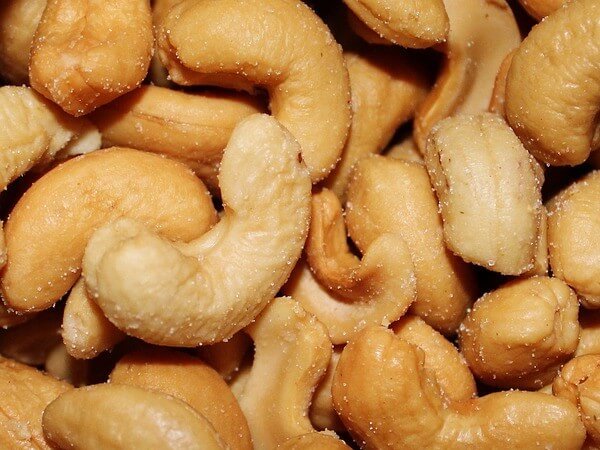
Yes, Cashews are bad for cats if you give them these nuts regularly. Some of the effects that Cashews can have on your feline friends are listed below.
1. High in Fat
One ounce of raw Cashews contains around 12.4 grams of fat which is considered unhealthy for cats. As obligate carnivores, cats thrive on animal protein and diet rich in amino acids.
Their digestive systems are not made to digest plant-based diets properly. Consuming such foods can lead to vomiting and diarrhea.
Furthermore, consistently eating foods rich in fat can lead to obesity in cats. This can pave a path towards other health issues like arthritis, diabetes, heart disease, and fatty liver disease.
2. High in phosphorus
Cashews are high in phosphorus, which can be problematic for cats with kidney disease.
Cats suffering from kidney disease aren’t able to filter phosphorous from their blood properly. A diet high in phosphorus can further worsen their condition.
3. Imbalanced calcium to phosphorus ratio
One ounce of raw Cashews contains 12.8 mg (2%) of calcium and a whopping 138.9 mg (14%) of phosphorous. This imbalance between calcium and phosphorous ratio can interfere with the cat’s ability to absorb these minerals.
Cats require a specific balance of calcium and phosphorus to maintain strong bones and teeth, and an imbalance can lead to health problems such as bone loss, weak bones, joint problems, fractures, and dental issues.
Other problems like urinary and kidney problems also tend to develop due to this imbalance. Urinary stones or blockages can develop, which can be painful and potentially life-threatening.
4. Risk of choking
Cashews are a hard and crunchy food that can pose a choking hazard to cats, particularly if they are not properly chewed.
If your fuzzy friends swallow a Cashew whole or partially, it can become lodged in their throat or esophagus, leading to respiratory distress and even death.
If the Cashew nut do manage to make its way down to the stomach, it can get stuck or lodged in the digestive tract and this can lead to bowel obstruction.
If you suspect that your feline friends has bowel obstruction, we highly recommend that you contact your vet as soon as possible. In the worst case scenario, this may require surgery to remove the Cashew nuts from the digestive system.
5. Low in taurine
Taurine is an essential amino acid that cats require in their diet to maintain normal heart function, vision, and immune system health.
However, Cashews are not a significant source of taurine. In one gram of Cashews, there is only 4.9 nanomoles of taurine. A diet lacking in this nutrient can lead to serious health problems in cats.
Apart from maintaining good visions, taurine is also responsible for regulating bile acids, promoting healthy gut bacteria, improving fertility in male and female cats, and preventing urinary tract problems.
6. Risk of fungal toxins
Cashews can become contaminated with aflatoxins, a type of fungal toxin produced by the mold known as Aspergillus flavus that can cause aflatoxicosis, liver damage, and cancer in cats.
Cats are more susceptible to aflatoxin poisoning because cats eat the same food over and over again, unlike humans.
For this reason, if cats keep eating Cashews regularly, the toxins can accumulate in their system and can cause poisoning.
7. High in sodium
The final reason to the question, “Are Cashews bad for Cats?” is because they contain a lot of sodium which can be problematic for cats with high blood pressure or heart disease.
A diet that is high in sodium can cause sodium poisoning, seizures, incoordination, vomiting, diarrhea, lethargy, and fluid retention, particularly in cats that are already suffering from these conditions.
It is recommended that cats should have less than ¾ of a teaspoon of salt per day to prevent the onset of any serious health conditions.
RECOMMENDED: Can Cats Eat Pecans?
Are Cashews toxic to Cats?
No, Cashews are not toxic to cats. However, they are not the most nutritionally beneficial treat for your feline friends. When cats eat Cashews regularly, they are at risk of developing heart disease or pancreatitis with time.
Furthermore, due to the high fat content in Cashews, it is easy for your feline friend to become overweight or obese.
Obesity has its own disadvantages as your cat grows older. An obese cat can have joint problems, such as arthritis, and even diabetes. Therefore, giving Cats Cashews is not a good idea in the long run.
Are Cashews dangerous for Cats?
Yes, Cashews can be dangerous for cats, especially if your fluffy companion is allergic to Cashews or she chokes on a Cashew nut.
Due to the hard texture of Cashews, they can easily be a choking hazard. The hard pieces of Cashew during chewing can lodge themselves in the cat’s throat, teeth, or digestive tract that can be discomforting and can also block the oxygen supply, which can result in death.
Are Cashews poisonous to Cats?
No, Cashews aren’t poisonous to cats. Your cat can have one or two Cashews once in a while without any major consequences.
However, you should give your cat a Cashew only under your supervision to ensure that your cat isn’t choking on it.
Because Cashews are high in fat, cats shouldn’t consume a lot of Cashews and certainly not every day. A lot of fat in a cat’s diet can lead to an upset stomach, diarrhea, and pancreatitis.
Are Cats allergic to Cashews?
Cashew allergies are fairly rare in cats, however, some cats can be allergic to Cashews. To determine whether your cat is allergic to them, observe what symptoms he or she shows after eating a Cashew or two.
These symptoms can include rashes, breathing problems, swelling, gastrointestinal problems such as vomiting and diarrhea, watery eyes, sneezing, or hair loss.
Are Cashews safe for Cats?
If you are still wondering, “are Cashews safe for Cats to Eat?” the general answer is no.
Cashews are not considered a safe food for cats to eat. While cats can consume small amounts of nuts or other human foods without issue, it is not recommended to feed them a diet that includes these types of foods.
If your furball is desperately begging for one, then you should keep in mind that you can only give Cashews to a cat that is 3 years old or older.
The frequency of consumption should also be no more than one or two Cashews per month. More than this can only do more harm than good for your cat, due to high calories and fat present in Cashews.
So, is Cashew safe for Cats? The answer is no. Cashews are safe for cats as long as you limit their intake.
As a general rule of thumb, your cat should have less than 10% of calories derived from treats.
Many pet owners may wonder, “are Cashews safe for Cats?” because they aren’t sure if they should give in to their cat’s begging.
Therefore, it should be noted that Cashews, like many other human foods, are not the right food or snack for cats. Feline owners should avoid giving Cashews to their fuzzy friends at all costs.
Are Cashews good for Cats?
Unfortunately, Cashews are not good for Cats. The nutritional profile of Cashews isn’t in line with the dietary requirements of cats.
Cats require at least 50% animal protein, 30% fat, and less than 10% carbohydrates in their daily diet.
On the other hand, in one cup or 137 grams of Cashews, there are 63.5 grams of fat, 44.8 grams of carbohydrates, and only a meager 21 grams of protein. That is too little protein to serve cat’s daily protein requirements.
Are Cashews ok for Cats?
No, Cashews are not ok for cats and they aren’t the best snack or food for cats. That’s because our four-legged friends have specific nutritional requirements for certain vitamins and minerals that are not found in Cashews, such as vitamin A, taurine, and arachidonic acid.
Taurine is essential for a strong heart and sharp vision, while vitamin A is necessary for healthy vision and skin. Arachidonic acid also keeps the cat’s skin and coat healthy and promotes reproductive health.
While Cashews are not toxic to cats, they provide little benefit to cats as they don’t have the necessary vitamins, minerals, and nutrients that a cat needs to stay healthy.
For these reasons, giving Cashews to cats can only lead to a ton of digestive and health issues for them.
My cat loves Cashews! How much Cashews should I give him?
When offering Cashews to your cat, you should know that they are high in calories and fat, which can lead to weight gain and digestive problems if consumed in large amounts.
For this reason, it’s best to limit the amount of Cashews you give to your cat to no more than one or two half Cashews at a time, and make sure they are unsalted and unflavored.
As a cat owner, you should keep in mind that Cashews cannot replace your cat’s regular diet. Cats require a nutritionally balanced diet that meets their specific needs for protein, vitamins, and minerals, while Cashews are too high in fat and too low in protein to fulfill those needs.
My cat ate Cashew! What should I do?
The first thing you should do is to observe your cat for any symptoms that may indicate an adverse reaction. Although Cashews are not poisonous for cats, they can cause digestive issues such as diarrhea, vomiting, or abdominal discomfort due to their high fat content.
If you notice any unusual symptoms or behavior in your kitties after they have eaten Cashews, contact your veterinarian immediately for advice.
Some of the symptoms that your cat may experience after eating Cashews can include diarrhea, vomiting, loss of appetite, dehydration, or abdominal discomfort.
Your veterinarian may recommend treatment options like medications to inhibit vomiting or diarrhea, fluid therapy to rehydrate your cat, and blood tests to check if your cat’s liver and pancreas are in proper working condition.
Your vet may also monitor your cat’s vital signs to see how she is faring and prescribe a special diet and some supplements to nurse your cat back to health.
Can Kittens eat Cashews?
No, kittens should not eat Cashews. That’s because our kittens’ immune system and digestive system aren’t properly developed yet to digest Cashews.
Also, our kittens’ diet should first be their mother’s milk. As they grow older, they require a diet that is rich in animal-based protein, such as meat, poultry, and fish. This is because they have specific nutritional requirements for essential amino acids, such as taurine and arginine, which are only found in animal-based protein sources and that is good for their growth.
Cashews contain too little protein to fulfill the daily protein intake of kittens. Cashews are also low in other essential nutrients that kittens require, such as calcium and vitamin D, which are necessary for bone growth and development.
In addition to nutritional concerns, feeding kittens Cashews may also increase the risk of digestive problems such as diarrhea, vomiting, and abdominal discomfort due to their high fat content.
Kittens have a delicate digestive system that may not be able to handle high-fat foods, especially if they are fed in large amounts.
Also, kittens don’t have fully developed teeth yet that can bite and chew Cashews properly.
For these reasons, it is best to not give any Cashew to your kitties.
Cats and Cashews
By now, we have figured out that Cats and Cashews don’t mix. Now let’s talk about whether Cashew milk is good for cats or not.
Can Cats drink Cashew milk?
Yes, cats can drink Cashew milk in small quantity, but most veterinarians don’t recommend it as a regular part of their diet.
Cashew milk is a non-dairy milk alternative that is made by blending Cashews with water and other ingredients, such as sweeteners or flavorings. While it may be safe for cats to consume in small amounts, it is not nutritionally complete or appropriate for their dietary needs.
As a plant-based milk, Cashew milk is low in protein and other essential nutrients that cats require. It may also contain other ingredients, such as added sugars or flavorings, that are not recommended for cats.
Although your cat may be attracted to Cashew milk due to its high fat content, it can cause pancreatitis, vomiting, diarrhea, and obesity in your pet.
READ NEXT: Oat Milk is also a non-diary drink. So is oat Milk safe for feline consumption? Check out Can Cats Drink Oat Milk? to find out.
Can Cats have Cashew milk?
Yes, cats can have Cashew milk in small quantity, but the truth is that our feline companions do not need any sort of milk in their diet, especially not plant-based milk.
As obligate carnivores, cats’ diet should mainly consist of animal protein. Cashews, on the other hand, have very little protein which isn’t enough to meet cat’s dietary requirements. For this reason, it is better to avoid giving your cat Cashew milk.
READ ALSO: Can Cats Drink Soy Milk?
Is Cashew milk safe for Cats?
While it may be safe for humans to consume Cashew milk, it is not recommended for cats due to the following reasons:
1. Nutritional deficiencies
Cashew milk is low in protein, which is an essential nutrient for cats. As obligate carnivores, cats’ diet should be rich in animal-based protein, such as meat, fish, or poultry.
From among the protein, a major requirement for cats is food that is high in vitamin A and taurine, which are essential for their health and can only be found in animal-based foods.
Cashew milk does not contain these nutrients in sufficient amounts, and it may lead to nutritional deficiencies if fed as a regular part of a cat’s diet.
2. High in carbohydrates
Cashew milk is also high in carbohydrates, which is not a natural part of a cat’s diet. Cats are designed to digest and metabolize protein and fat, not carbohydrates.
Feeding Cashew milk to cats may cause digestive upset and lead to obesity or other health issues if consumed in large amounts.
3. Added ingredients
Cashew milk may contain added sweeteners or flavorings that are not safe for cats. For example, some Cashew milk brands may contain xylitol, a sweetener that is toxic to cats and can lead to hypoglycemia and liver failure if they drink this milk every day.
4. Digestive issues
Cashew milk may cause digestive issues in cats, especially if they have a sensitive digestive system. Cats may experience vomiting, diarrhea, or abdominal discomfort if they consume Cashew milk.
5. Allergic reactions
Cats may be allergic to Cashews or other ingredients in Cashew milk. An allergic reaction in cats can include symptoms such as swelling, itching, watery eyes, or difficulty breathing. In severe cases, allergic reactions can result in death and require immediate veterinary care.
DON’T MISS: Can Cats Drink Almond Milk?
Safe and feline-friendly alternative to Cashews Milk for cats
Because Cashew milk has several disadvantages to cats, it is better to invest in a feline-friendly alternative to Cashew milk, especially if your cat loves the smell and taste of Cashew milk and won’t stay away from it.
Whiskas Catmilk for Cats and Kittens
Whiskas Catmilk is a protein-rich drink with more than 98% lactose reduced. It is full of essential nutrients like calcium and crude protein that keeps your cat’s bones and teeth healthy. Due to majority of lactose removed, it is easy for your feline friends to digest the milk without getting an upset stomach.
Furthermore, Whiskas Catmilk contains extra taurine, which is an essential amino acid for cats and maintains their healthy heart and strong vision.
Your cat would love the taste of this drink as it tastes like actual milk without all the lactose that causes bloating and diarrhea in lactose intolerant cats.
Can Cats Eat Cashew butter?
No, cats should not at Cashew butter because it is very high in fat and can lead to a variety of digestive issues in the short run. In the long run, cats can suffer from obesity, diabetes, pancreatitis, or heart disease.
Cashew butter is a spread made from ground Cashews. It is similar to other butters made from nuts, such as almond butter or peanut butter.
Cashew butter is rich in healthy fats, and vitamins and minerals such as phosphorus, magnesium, and zinc.
Unlike peanut butter, Cashew butter is not considered a common allergen in cats or humans.
Can Cats have Cashew butter?
No, cats should not have Cashew butter because it isn’t very nutritious for cats and doesn’t fit into their dietary requirements.
Cashew butter can also contain added sugars, salts, or other ingredients that could harm your fuzzy friend’s health.
The added salt can cause sodium poisoning leading to seizures, incoordination, lethargy, vomiting, or diarrhea.
In addition, sugar can lead to diabetes in the future.
When given as an occasional treat once in a while is fine, Cashew butter should not be a regular part of your cat’s diet.
If you do give your cat Cashew butter, make sure it is unsalted and unsweetened. You can also try mixing it with their regular food or using it as a special reward for good behavior.
If your feline companion starts to show the following signs after eating Cashew butter, seek veterinary care immediately:
- Upset stomach.
- Vomiting.
- Diarrhea.
- Difficulty breathing.
Cats and Cashew nuts
While Cashew nuts are not toxic for cats (as we have established above), they are still not worth it for feline consumption. Their nutritional profile is enough reasons why Cashew nuts are not the best food for cats.
Let’s discuss this in more detail below.
Can Cats Eat Cashew nuts?
Cats can eat Cashew nuts but vets don’t recommend this food for cats because of their high fat content. Also, some store-bought Cashews nuts are seasoned with salt. Too much salt is not good for cats as it can lead to sodium poisoning, incoordination, seizures, lethargy, vomiting, and diarrhea.
Therefore, when you see your cats eating Cashew nuts, remove them from cat’s reach as soon as you can.
Are Cashew nuts bad for Cats?
Yes, Cashew nuts are bad for Cats when given in large amounts or very frequently. That’s because Cashew nuts can pose a lot of problems in cats.
Because Cashews nuts are high in fat, they can be difficult for cats to digest properly. Consuming too many Cashews can cause gastrointestinal problems such as diarrhea, vomiting, and stomach upset.
Cashews are not a complete source of nutrition for cats and lack essential amino acids and other nutrients that cats need for optimal health. They are also hard to chew and can be a choking hazard for cats.
Additionally, some cats may be allergic to Cashews or other similar nuts.
Signs of an allergic reaction in cats include vomiting, diarrhea, difficulty breathing, and skin irritation.
Can cats eat salted Cashews?
No, cats should not eat salted Cashews or any other type of salty food. Consuming too much salt can lead to electrolyte imbalances, dehydration, lethargy, vomiting, and diarrhea in cats.
A diet that is high in salt can cause the kidneys to work harder to eliminate the excess sodium from the body. This can lead to dehydration, increased thirst, and other health problems.
If you want to give your cat Cashews as a treat, it is important to choose unsalted Cashews or other unsalted nuts.
Can cats eat roasted Cashews?
No, cats should not eat roasted Cashews. Although roasted Cashews are not inherently harmful or toxic to cats, they can be high in fat and salt, which can cause digestive problems and other health issues in cats if consumed in large amounts.
Moreover, roasting Cashews can further increase their fat content, as roasting can cause the nuts to absorb more oil. Too much fat in a cat’s diet can lead to obesity, diabetes, arthritis, heart disease, and liver disease.
Can cats have Cashew yogurt?
No, cats should not have Cashew yogurt. In fact, many vets don’t recommend giving your cat Cashew yogurt or any other type of yogurt or dairy product, unless it is specifically formulated for cats.
While Cashew yogurt itself is not toxic to cats, many cats are lactose intolerant and cannot properly digest dairy products like yogurt.
Feeding them dairy products can cause digestive problems such as diarrhea, vomiting, and abdominal discomfort.
In addition, Cashew yogurt is a plant-based alternative to dairy yogurt, and it is not a natural part of a cat’s diet. Cats are obligate carnivores, which means their diet should be high in animal protein and low in carbohydrates.
Therefore, a plant-based diet, like Cashew yogurt, does not provide the specific nutrients that cats need for optimal health.
So, Can Cats Eat Cashews?
In conclusion, while Cashews are not toxic to cats, they are not a natural part of their diet and are not recommended as a regular food.
While they can be a source of fat, they are not a complete source of nutrition for cats, and feeding them in large amounts can lead to digestive problems and other health issues.
Additionally, roasted and salted Cashews can be too high in fat and salt, which can be harmful to cats. If you want to give your cat a treat, it is best to choose a food that is specifically formulated for cats and meets their nutritional requirements.
We recommend that you consult with your veterinarian for nutritional advice for your fuzzy family member or when introducing new foods to their diet.
Related Questions
Macadamia nuts, walnuts, pecans, hickory nuts are all toxic to cats.
A few Cashews, perhaps one to two Cashews as an occasional treat, should be enough.
No, Cashews are not toxic to pets. However, they contain a lot of fat and carbohydrates that can cause health issues in cats.
Cats and dogs can both eat Cashews but it isn’t recommended for them. This is because of the high fat content in Cashews and lack of animal-protein present in them.
Nuts are mainly human food and are not made for feline consumption. Therefore, it would be best if cats are not given any nuts.
DISCLAIMER: THIS WEBSITE DOES NOT PROVIDE MEDICAL ADVICE
The information, including but not limited to, text, graphics, images and other material contained on this website are for informational purposes only. No material on this site is intended to be a substitute for professional veterinary advice, diagnosis, or treatment. Always seek the advice of your veterinarian or other qualified health care provider with any questions you may have regarding dietary needs.
Resources:
https://www.health.harvard.edu/heart-health/cashews-a-better-choice-than-low-fat-chips
https://en.wikipedia.org/wiki/Cashew
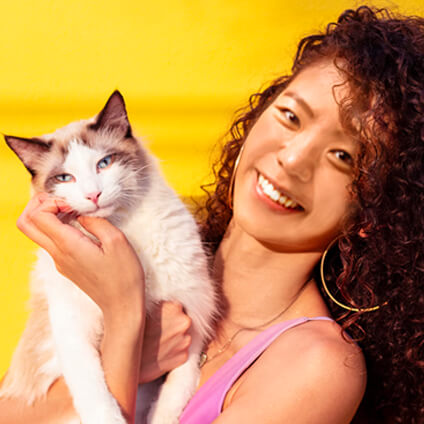
With over five years of specialized experience as an animal writer, my expertise lies in cat nutrition, health, behavior, grooming, and training. I am dedicated to delivering helpful and informative content that caters to the well-being of our feline friends. My primary goal is to empower pet owners with knowledge and ensure our feline companions thrive in health and happiness. In my free time, I love volunteering at local cat rescue centers.
